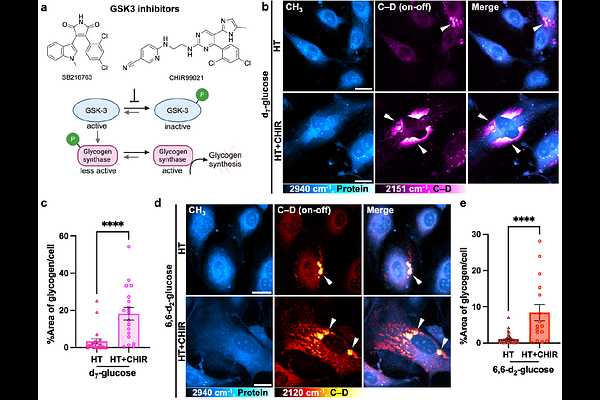Single-Cell Metabolic Imaging Reveals Glycogen Driven-Adaptations in Endothelial Cells

Single-Cell Metabolic Imaging Reveals Glycogen Driven-Adaptations in Endothelial Cells
Chadha, R. S.; Yang, B.; Yuan, D.; Kocheril, P. A.; Mahajan, S.; Colazo, A.; Malhi, N. K.; Ambarian, J. A.; Liu, X.; Chen, Z. B.; Wei, L.
AbstractEndothelial dysfunction (ED) is a defining feature of diabetes mellitus (DM) and a key contributor to many metabolic and cardiovascular diseases. Endothelial cells (ECs) are known to be highly glycolytic and primarily rely on glucose to meet their energy demands. However, the role of glycogen metabolism in ECs remains poorly characterized due to a lack of suitable tools. Here, we utilize stimulated Raman scattering (SRS) microscopy to investigate glycogen metabolism in live ECs exposed to a diabetes-mimicking milieu- high glucose and tumor necrosis factor (TNF-). We show that ECs divert excess glucose toward subcellular glycogen storage, and that this storage capacity is significantly enhanced by the inhibition of glycogen synthase kinase 3 (GSK3). Pulse-chase experiments uncover glycogen dynamics and reveal rapid mobilization under glucose starvation, highlighting its role as an immediate energy reserve. We further extend the capabilities of SRS imaging to visualize glutamine and lactate metabolism for the first time, directly showcasing EC reliance on alternative substrates during glucose deprivation. ECs containing glycogen exhibit reduced immediate metabolic demand for these gluconeogenic substrates. These findings suggest that glycogen may play a regulatory role in modulating stress-responsive metabolic adaptations and may offer therapeutic opportunities to address diabetes-induced ED and related cardiometabolic diseases.